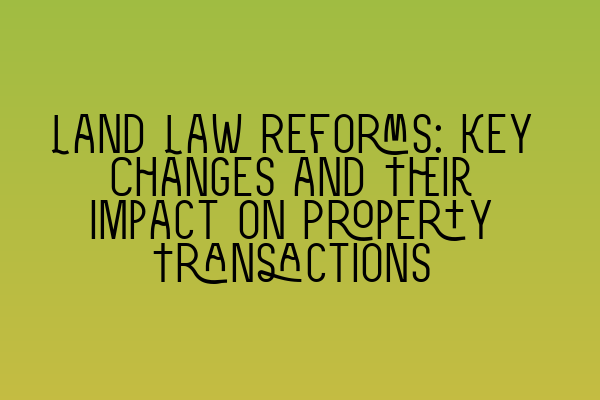Land Law Reforms: Key Changes and Their Impact on Property Transactions
Introduction:
In recent years, the field of land law has witnessed significant reforms that have had a profound impact on property transactions. These reforms aim to modernize and streamline the legal framework, ensuring efficiency and fairness in property dealings. As a solicitor specialising in property law at SQE Property Law & Land Law, it is essential to stay up-to-date with these changes to provide knowledgeable and effective legal advice to our clients.
In this blog post, we will delve into the key land law reforms, exploring their implications for property transactions. We will examine the reforms in areas such as land registration, leasehold reform, and compulsory purchase, among others. So, let’s dive in!
1. Land Registration Reform:
Land registration is a crucial aspect of property transactions, providing a transparent and reliable system of property ownership. The recent land law reforms have aimed to simplify and digitize the registration process, making it more accessible and efficient for both property owners and conveyancers.
One significant change is the introduction of electronic conveyancing, allowing for online submission of land registration applications. This development has streamlined the process, reducing paperwork and enabling faster transactions. Solicitors can now submit applications electronically, eliminating the need for physical document handling and postal delays.
Additionally, the reforms have focused on enhancing the accuracy and comprehensiveness of the land register. This ensures that potential buyers have access to reliable information regarding ownership, charges, and other interests in the property. Such transparency promotes a fair and informed market for property transactions.
2. Leasehold Reform:
Leasehold reform has been another area targeted by land law reforms. The aim is to increase fairness and protection for leaseholders, who often face challenges and unfair practices.
Under the reforms, leaseholders now have the right to extend their leases or purchase the freehold of their property. This gives them greater control and security over their homes, reducing the risk of exploitation by unscrupulous landlords.
The reforms have also addressed the issue of onerous ground rent terms, which can escalate over time, making properties difficult to sell. Leaseholders now have the right to challenge unfair ground rent clauses and seek redress from landlords. This ensures that leasehold properties remain a viable and attractive option for potential buyers.
3. Compulsory Purchase Reform:
Compulsory purchase powers enable governmental and local authorities to acquire private land for public purposes. The land law reforms have sought to strike a balance between the need for public infrastructure development and the protection of private property rights.
One significant change is the requirement for more robust justification for compulsory acquisition. Authorities must demonstrate a compelling public interest and prove that acquisition is the only feasible solution. This safeguards property owners against arbitrary or unnecessary acquisition of their land.
The reforms have also introduced fairer compensation provisions for landowners affected by compulsory purchase. This ensures that property owners receive adequate compensation for the value of their land, as well as any associated disturbance and loss of amenity.
Conclusion:
The recent land law reforms have brought about significant changes in various aspects of property transactions. From land registration to leasehold reform and compulsory purchase, these reforms aim to enhance efficiency, fairness, and transparency in the field of property law.
As solicitors at SQE Property Law & Land Law, it is our responsibility to stay updated with these reforms and provide expert advice to our clients. By understanding and navigating these changes, we can offer effective legal representation and ensure smooth property transactions for our valued clients.
If you want to learn more about SQE 1 practice exam questions or SQE 2 preparation courses, feel free to check out our related articles.
Related Articles:
– SQE 1 Practice Exam Questions
– SQE 1 Practice Mocks FLK1 FLK2
– SQE 2 Preparation Courses
– SQE 1 Preparation Courses
– SRA SQE Exam Dates
